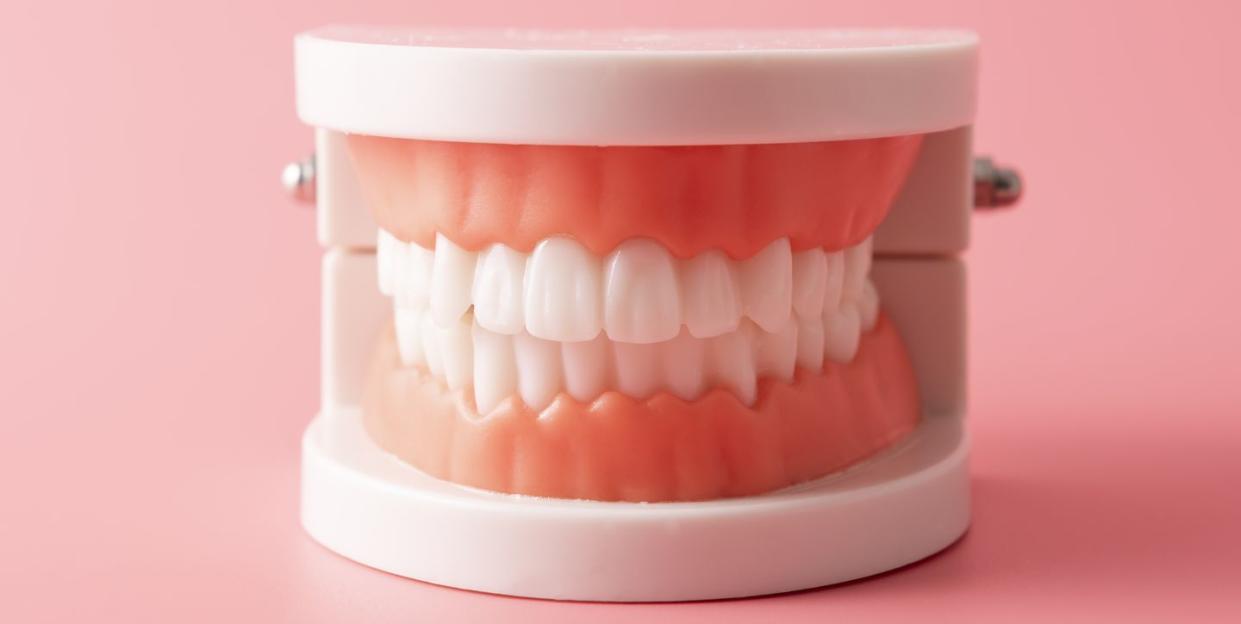A Dentist Explains Why Your Gums Bleed

When the dentist urges you floss diligently for the 12th time in one visit, it’s not an overstatement. That’s because seeing red in the sink after your nightly brush is never a good sign. “Gum tissue in general is sensitive,” explains Richard J. Lipari, D.D.S., a cosmetic and restorative dentist in Chappaqua, NY. And taking care of it is crucial to avoid bleeding gums. Ahead, Dr. Lipari explains why gums tend to bleed, how bleeding gums are treated, and when they go beyond bad basic oral hygiene.
Why are gums so prone to bleeding?
Some individuals simply have less resilient gums than others, says Dr. Lipari, which is the case for those who are genetically predisposed to the trait or naturally have thinner tissue. Those people, unfortunately, are usually more prone to gum issues and recession, Lipari adds. But there are other more concrete reasons anyone could develop bleeding gums.
Bleeding gums causes
Although oral health is often the first place to look for the cause of bleeding gums, the mouth doesn’t always house the problem.
Gingivitis or periodontitis
Gingivitis is the medical term for inflamed gums, which is caused by a buildup of plaque at the gum line, per the National Library of Medicine. And a main symptom of it is bleeding gums. Periodontitis develops when gingivitis worsens—the plaque becomes tartar and affects the jaw bone, sometimes leading to teeth loss. Dr. Lipari says poor oral hygiene and smoking are the main causes of both.
Diabetes
People with diabetes are more likely to experience oral health problems due to a loss in saliva production. Saliva aids dental health by helping to clean and protect the teeth and gums—and diabetes, along with some medication used to treat it, can impair salivary gland production, per the National Institute of Diabetes and Digestive and Kidney Diseases.
Brushing too hard
“It is a common misconception that a harder brush gives you a better scrub and the reality of it is that those hard bristles are too abrasive for the gum tissue,” says Dr. Lipari. “A soft or extra soft brush will clean your teeth just as effectively and protect your gums.”
Medication side effects
Dr. Lipari says that taking some medications, namely blood thinners and high blood pressure treatments, can result in gums that bleed easily or inflamed gums as a side effect.
Vitamin deficiency
A sign that you are deficient in vitamin C (a.k.a. “scurvy”) or vitamin K is bleeding gums, according to the National Library of Medicine.
Hormonal changes
Research has shown that when women experience fluctuations in estrogen and progesterone during pregnancy, puberty, and menopause (or while taking birth control), they become more prone to oral health and gum issues.
Leukemia
Leukemia is a cancer of the blood, and bleeding gums is a known symptom caused by a shortage of platelets that are key to stopping bleeding from happening, per the American Cancer Society.
Bleeding gums treatment, prevention, and when to see a doctor
If you’re dealing with a medical condition like those described above, the primary issue should be addressed. However, to simply prevent bleeding gums and maintain good oral health, you can make your dentist proud by following their advice.
“Brushing twice per day and flossing is the best thing you can do on a daily basis,” says Dr. Lipari. “Also, seeing your dentist at least twice per year for a professional cleaning is essential.”
If you notice bleeding that concerns you, and it doesn’t resolve within two weeks of consistent brushing and flossing, Dr. Lipari recommends seeing a dentist right away.
You Might Also Like

